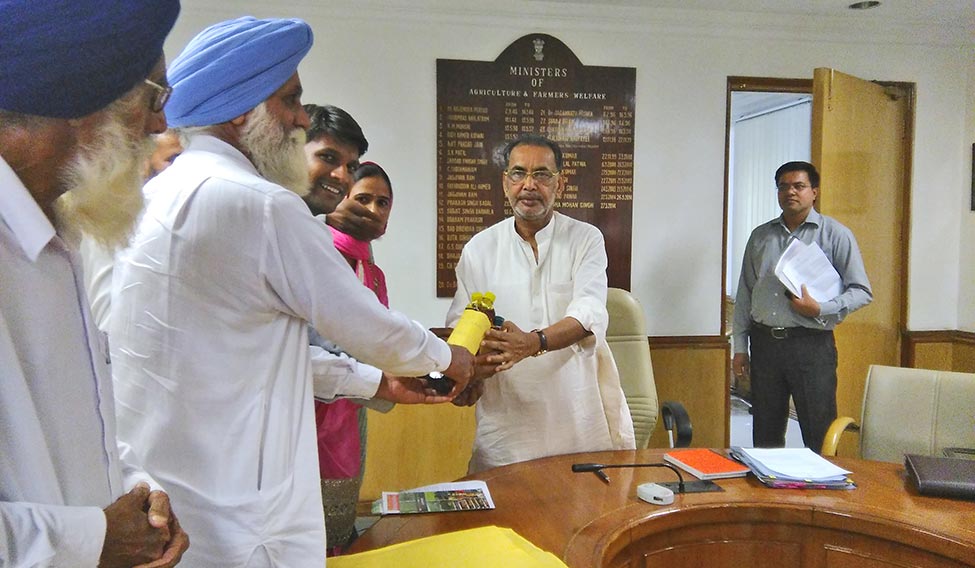In a popular parable, Jesus said: “The Kingdom of Heaven is like a grain of mustard seed, which a man took, and sowed in his field; which indeed is smaller than all seeds. But when it is grown, it is greater than the herbs, and becomes a tree, so that the birds of the air come and lodge in its branches.” All good stories have a spoonful of hyperbole in it. What Jesus hinted at was that things that start very small could soon turn very big.
The same can also be said of the gene-modified mustard in India. The variety of grey or pale yellow, brown and black mustards that are used in Indian cuisine, may soon give way to a more modern yellowish brown cousin.
Mustard oil, the most consumed edible oil in India, could also undergo significant changes. The pungent local variety could make way for a less pungent, darker coloured, lighter oil, much similar to canola oil.
On September 5, India’s bio-safety regulator—Genetic Engineering Approval Committee (GEAC)—invited comments for “the proposal on authorisation of the environmental release of Genetically Engineered Mustard (Brassica juncea or typically the brown mustard) hybrid DMH-11 and use of parental events for development of new generation hybrids.”
The move to develop India’s first gene-modified food crop began exactly two decades ago. Verghese Kurien, the Amul man, wanted to develop a mellower mustard because the pungent mustard oil sold by the National Dairy Development Board, under its Dhara brand, was not liked by all. Consumers in eastern and some parts of northern India liked the traditional mustard oil. But, western and southern India wanted a less pungent option.
Kurien was NDDB chairman from 1965 to 1998. In 1996, he engaged biotech researchers from TERI for the project. Research started the same year with a NDDB grant of Rs 51 crore.
After Kurien stepped down, NDDB’s interest waned. And, by then, a number of less pungent edible oils had hit the Indian market. Research in recent years was funded by Delhi University and the Union government’s department of biotechnology. The department brought Rs 28 crore to the research. In 2010, its developers approached the GEAC seeking bio-safety approval for the new mustard line, DMH-11. All new agri-produce go through regulatory tests to establish bio-safety.
DMH-11, expanded as Dhara Mustard Hybrid-11, was developed in Delhi University’s Centre for Genetic Manipulation in Crop Plants, with technological aid from Monsanto. GEAC has pronounced it to be bio-safe and ready for commercial release.
The controversy around DMH-11 is that even as recent as February, the same GEAC sub-committee which cleared it now had pulled up developers over supposed gaps and lapses in ascertaining bio-safety. The sub-committee sought additional documents on bio-safety risk assessment and risk management. It also wanted to know the full extent of the strain’s weed resistant potential.
Other queries: Why microbial count in soil (considered essential for soil health) was found less during the time of tests? The claimed Least Significant Difference (LSD) in oil content was 5 per cent, but was leading to statistical non-validation in later tests. Why? Kidneys of female rats fed on GM mustard were found to be heavier. Why?
The sub-committee also sought evidence from the developers of the crop to prove through tests, that the barnase protein derived from e-coli bacteria available in soils and used in GM mustard, is as active as other preparations of barnase protein. “The validity of the acute toxicity study hinges on this assumption,” the GEAC noted. Despite the barrage of queries, the DMH-11 was cleared.
Debal Deb, a rice breeder scientist and an ecologist, said: “We fail to understand how in just six months it is possible to submit so much scientific evidence and convince the GEAC instantly.” Scientists like Deb, farmers’ unions and associations of organic farmers were earlier called on by the GEAC to be part of the discussion process. “After the 126th meeting held in January, the GEAC had not consulted anyone else. Meetings were held behind closed doors and the minutes hardly shared. More worrying is the fact that there was no health safety expert in the sub-committee processes,” said Deb.
The environment ministry later clarified that Dr B. Sesikeran, an MD in pathology and former director of the National Institute of Nutrition, was part of the sub-committee and chairman of the review committee on genetic manipulation. Interestingly, Sesikeran is also on the board of International Life Sciences Institute, an industry body that pushes GM technology internationally. ILSI is backed by Monsanto, Bayer, Syngenta and other transgenic crop producers. Food multinationals like Nestle are also members. Sesikeran is a trustee of ILSI India. A number of citizens’ forum members, who were part of the GEAC public consultation on GM mustard, noted that Sesikeran was not present at the meetings.

Meanwhile, more than 50 farmers’ unions have joined hands to form the Kisan Ekta Convention. “In our fourth convention held in Nagpur, we unanimously passed a resolution that the risky, harmful and unproductive GM mustard research must be banned,” said Devinder Sharma, a farm expert and convener of Kisan Ekta Convention. “Instead, the government should provide farmers with a higher support price for oilseeds, along with assured procurement to boost domestic oilseeds production. We already have enough number of high yielding varieties of mustard available to farmers.”
In early September organic farmers, mostly from Punjab, Haryana and Bihar, visited Union Agriculture Minister Radha Mohan Singh at his Krishi Bhavan office. They presented him with a bottle of organic, cold-pressed mustard oil. “We told him, ‘If you would like to use this mustard oil, please ask your government to put on hold the approval of GM mustard’,” said Swaran Singh, a farmer from Punjab.
Now that the GEAC has given the bio-safety approval to GM mustard, the government aims to introduce the new crop before the ensuing rabi planting season. Organic farmers fear a loss of demand once the new crop is introduced. “We told the minister that there is an imminent threat to our status as organic farmers, right to free choice, seed autonomy and biodiversity,” said Neelam, a woman farmer from Jhajjar, Haryana. “GM mustard will destroy not just organic farming, but also purity of centuries-old traditional mustard varieties forever.”
After meeting the delegation, Radha Mohan Singh said, “We have convinced them that the government wants to promote a traditional and organic agriculture through our various government missions and schemes. We will ensure all our efforts to target a higher growth of this sector.” Singh reassured them that the concerns would be conveyed to the prime minister.
Kavitha Kuruganti, convener of Alliance for Sustainable & Holistic Agriculture, said members of the GEAC had conflict of interest. In addition to Sesikeran’s case, she named Dr C.R. Babu, pro vice chancellor of Delhi University. She said Babu and Deepak Pental, developer of DHM-11, were “from the same university and were good friends”.
States have sent missives to Prime Minister Narendra Modi, expressing their disapproval of GM mustard. “GM mustard will finish the identity of Punjab’s farmers,” said Kapil Mishra, Delhi water resources minister and Aam Aadmi Party leader. “They have already petitioned Delhi chief minister Arvind Kejriwal about this and our party will be fighting elections with the promise that we will ban GM mustard and any GM seed if we come to power” in Punjab.
Bihar Chief Minister Nitish Kumar wrote to Modi: “It is widely known that Bt cotton productivity has dropped, with the bollguard pests becoming resistant to the crop and causing distress among farmers. Why allow another GM seed?”
States like Himachal Pradesh, Madhya Pradesh, Uttarakhand, Karnataka and Kerala have declared their states to be GM-free and are encouraging organic farming. “India is a signatory to the Cartagena Protocol on Biosafety that includes socio-economic considerations as an integral part of risk assessment on genetically modified organisms,” said Rajinder Chaudhary, member, Organic Food Exporters Association of India.
The section of the scientific community which works closely with the seed industry remains particularly positive about the debate. “The development of GM mustard by Delhi University is a classic example of India’s scientific capability to harness science of biotechnology and farm innovation. India faces a huge deficit in edible oil production and annually imports approximately 14.5 million tonnes of edible oil, including oil extracted from GM soybean and GM canola. We had written to the GEAC asking it to reinstate its approval for GM mustard,” said Bhagirath Chaudhary, founder director, South Asia Biotechnology Centre.
The final approval for GM mustard rests on the shoulders of Union Minister For Environment and Forest Prakash Javadekar. He has so far refused to comment on GM mustard. Whether the final decision will ride on Javadekar’s shoulders or on Prime Minister Modi’s, only time will tell.








